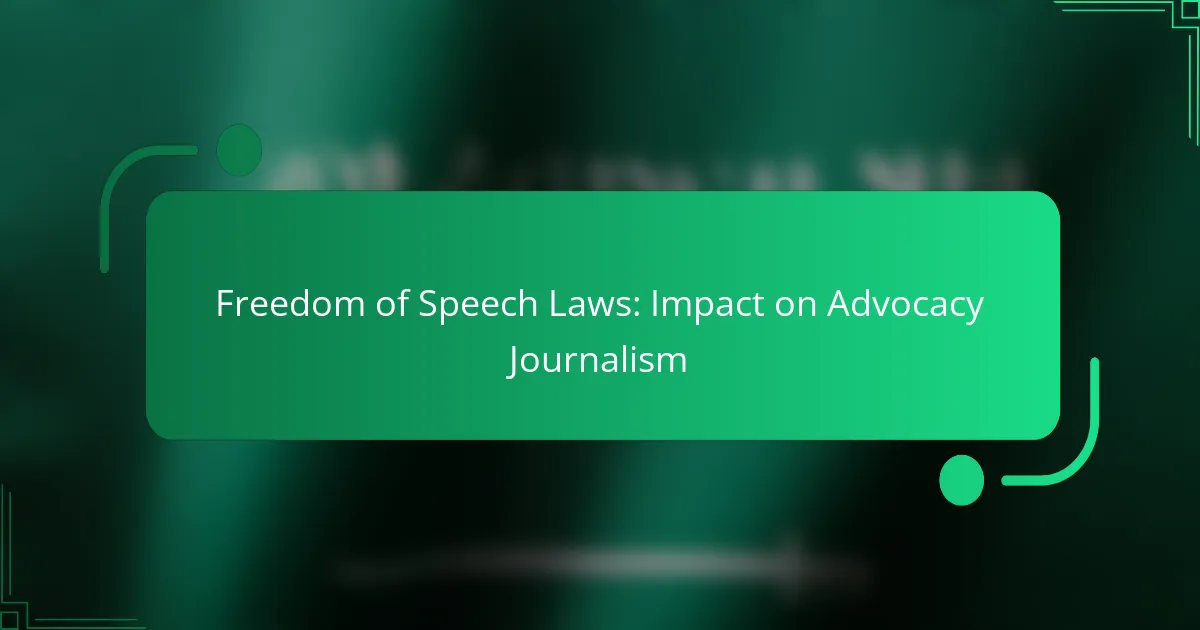Freedom of speech laws play a crucial role in shaping advocacy journalism in the United States, offering essential protections that allow journalists to voice opinions and tackle controversial topics. These legal frameworks not only safeguard the rights of journalists but also promote a vibrant public discourse, although they also present challenges such as legal threats and public backlash that can impede effective reporting and advocacy.
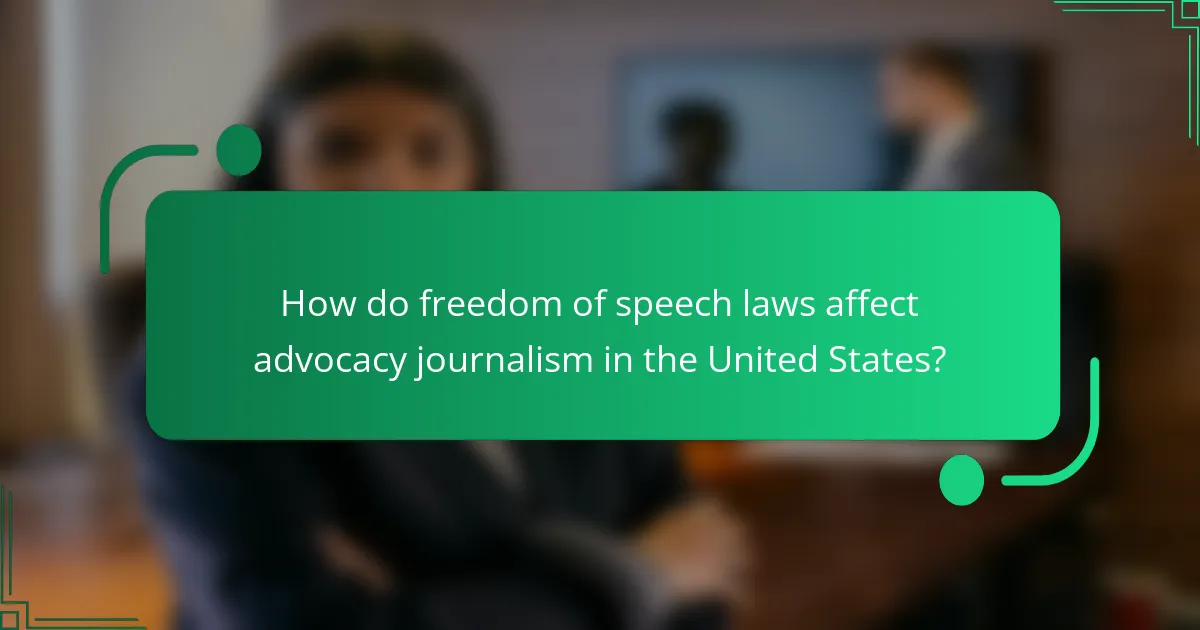
How do freedom of speech laws affect advocacy journalism in the United States?
Freedom of speech laws significantly impact advocacy journalism in the United States by providing protections for journalists to express opinions and report on controversial issues. These laws enable journalists to engage in advocacy without fear of censorship or legal repercussions, fostering a more informed public discourse.
Protection of journalistic expression
Freedom of speech laws safeguard journalistic expression by allowing reporters to cover sensitive topics, including political dissent and social justice issues. This legal framework supports the idea that journalists can advocate for change and hold power accountable without facing undue restrictions.
Additionally, protections under the First Amendment ensure that journalists can publish their findings and opinions, which is crucial for advocacy journalism. This freedom encourages diverse viewpoints and promotes a healthy exchange of ideas in society.
Challenges faced by journalists
Despite these protections, journalists often encounter challenges such as threats, harassment, and legal actions aimed at silencing their voices. Advocacy journalists may face backlash from powerful entities or individuals who disagree with their reporting, leading to intimidation tactics that can undermine their work.
Moreover, the evolving digital landscape poses new challenges, including issues related to misinformation and the regulation of online content. Journalists must navigate these complexities while maintaining their commitment to truth and advocacy.
Case studies of landmark rulings
Several landmark rulings have shaped the landscape of advocacy journalism in the U.S. One notable case is New York Times Co. v. Sullivan, which established the “actual malice” standard, protecting journalists from libel suits when reporting on public figures. This ruling reinforced the importance of robust journalistic expression in the context of advocacy.
Another significant case is Branzburg v. Hayes, which addressed the issue of reporter’s privilege. While the ruling limited protections for journalists in some contexts, it highlighted the ongoing debate about the balance between press freedom and legal obligations. These cases illustrate the complexities and evolving nature of freedom of speech laws as they relate to advocacy journalism.
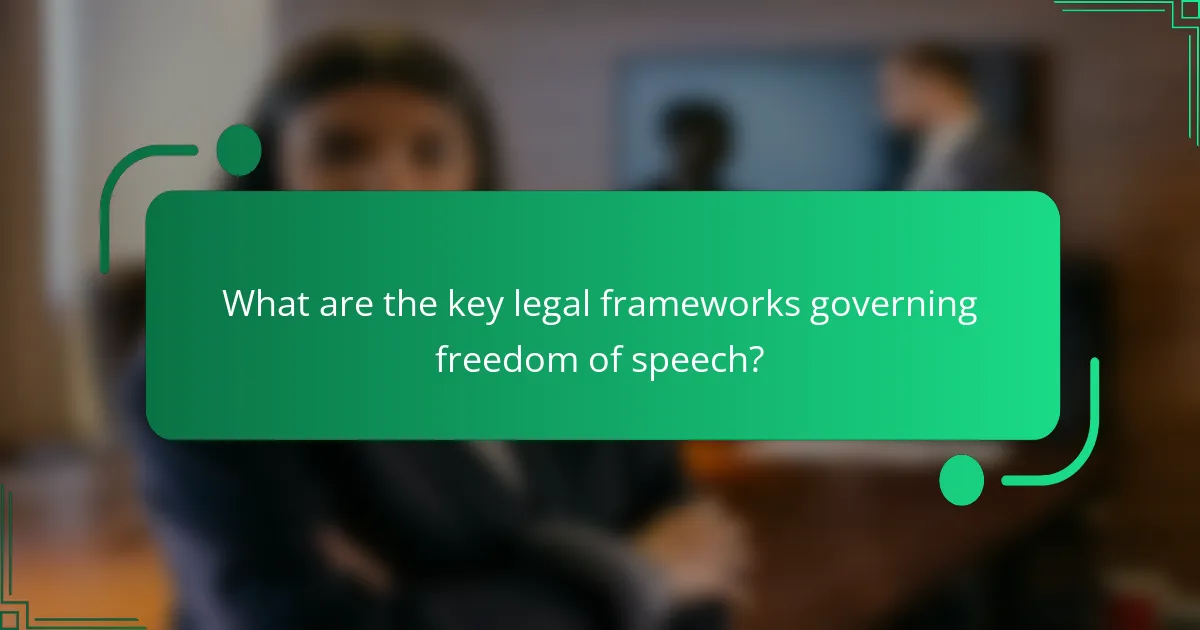
What are the key legal frameworks governing freedom of speech?
The key legal frameworks governing freedom of speech include constitutional provisions, statutory laws, and judicial interpretations that protect individuals’ rights to express opinions and disseminate information. In the United States, these frameworks significantly influence advocacy journalism, shaping how journalists operate and the limits of their expression.
First Amendment of the U.S. Constitution
The First Amendment is a cornerstone of freedom of speech in the United States, prohibiting Congress from making laws that infringe on the freedom of speech or the press. This protection extends to advocacy journalism, allowing journalists to report on issues of public interest without fear of government censorship.
However, the First Amendment does not provide absolute protection. Speech that incites violence, constitutes defamation, or involves obscenity may still be regulated. Journalists must navigate these boundaries carefully to avoid legal repercussions while advocating for their causes.
State-specific laws and regulations
In addition to the First Amendment, various state-specific laws and regulations can impact freedom of speech and advocacy journalism. Each state may have its own statutes that address issues such as defamation, privacy, and public records, which can affect how journalists report on sensitive topics.
For example, some states have stronger shield laws that protect journalists from revealing their sources, while others may impose stricter regulations on public disclosures. Understanding these local laws is crucial for journalists to effectively advocate for their causes while minimizing legal risks.
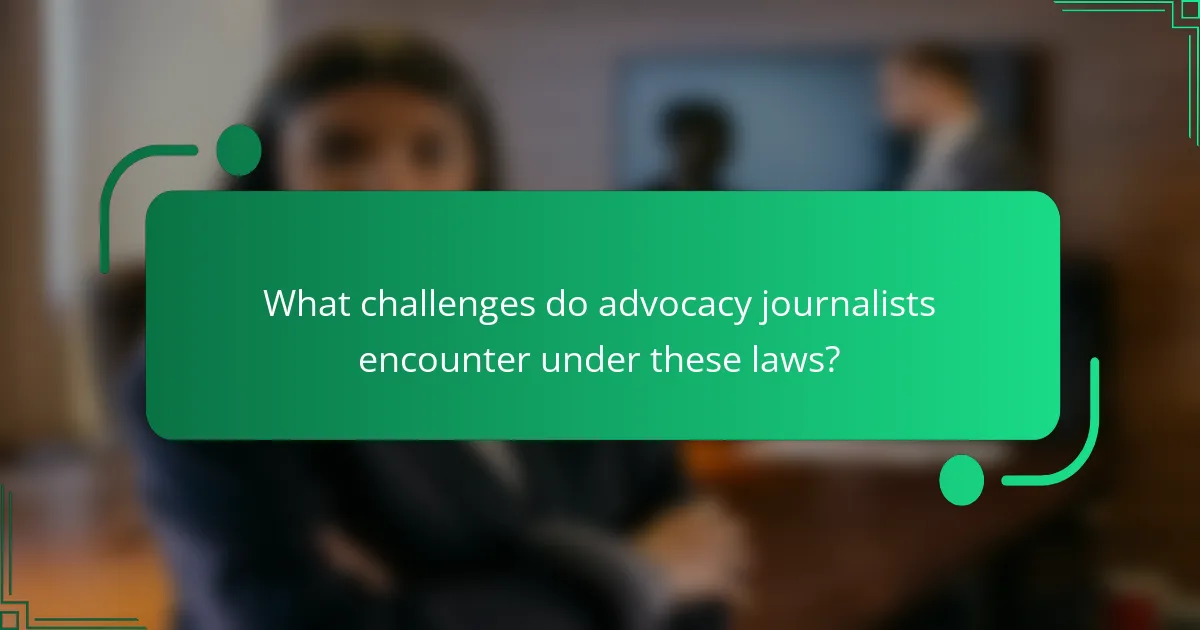
What challenges do advocacy journalists encounter under these laws?
Advocacy journalists face significant challenges under freedom of speech laws, including legal threats and public backlash. These obstacles can hinder their ability to report on critical issues and advocate for change effectively.
Legal threats and censorship
Legal threats against advocacy journalists often arise from powerful entities that feel threatened by their reporting. These threats can include lawsuits, defamation claims, or even criminal charges, which can create a chilling effect on journalistic freedom.
Censorship can also manifest through governmental regulations or pressure from corporations, leading to self-censorship among journalists. In some countries, laws may restrict the dissemination of certain information, complicating the work of those advocating for social justice or political reform.
Public backlash and safety concerns
Advocacy journalists frequently encounter public backlash, which can range from negative social media campaigns to threats of violence. This backlash can deter journalists from pursuing stories that challenge the status quo or expose wrongdoing.
Safety concerns are paramount, as journalists may face harassment or physical harm due to their work. It is crucial for advocacy journalists to implement safety measures, such as using secure communication tools and establishing protocols for emergency situations, to protect themselves while reporting.
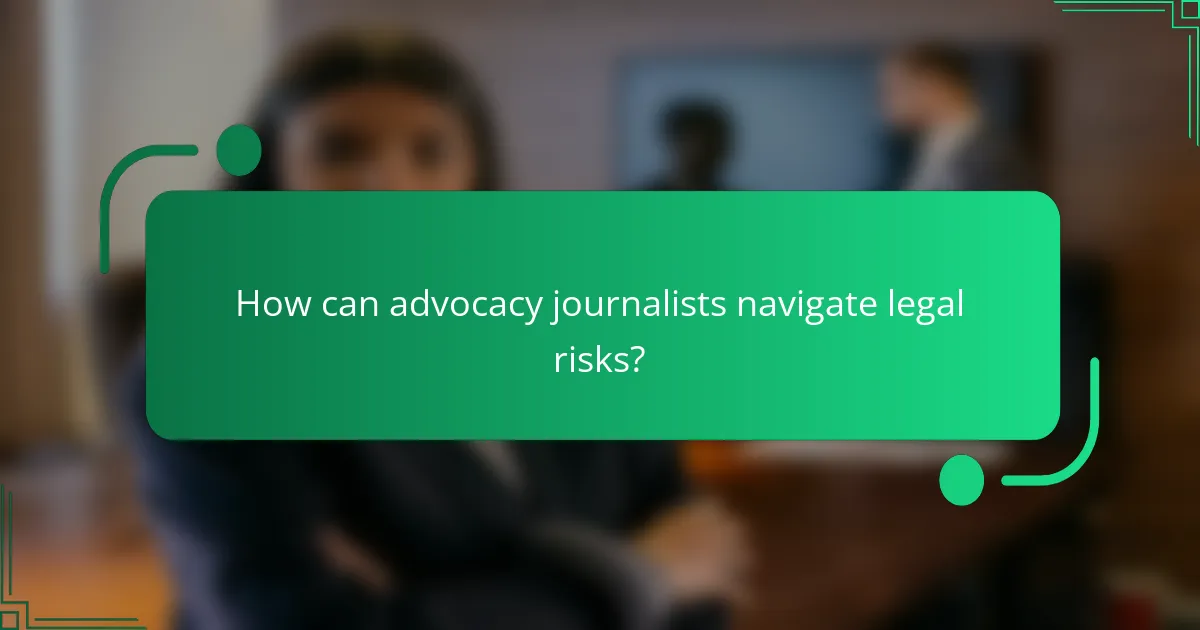
How can advocacy journalists navigate legal risks?
Advocacy journalists can navigate legal risks by understanding their rights and the legal landscape surrounding their work. This involves being aware of protections for free speech and seeking legal advice when necessary to mitigate potential liabilities.
Understanding legal protections
Advocacy journalists should familiarize themselves with laws that protect freedom of speech, such as the First Amendment in the United States or similar provisions in other countries. These laws often provide a framework that allows journalists to express opinions and report on issues without fear of censorship or retaliation.
Additionally, understanding the concept of “fair use” in copyright law can help journalists use third-party materials without infringing on rights. Knowing the limits of defamation laws is also crucial, as it helps in avoiding legal pitfalls when reporting on sensitive topics.
Utilizing legal resources and support
Advocacy journalists should consider joining professional organizations that offer legal resources and support, such as the Reporters Committee for Freedom of the Press or similar entities in their region. These organizations often provide access to legal advice, educational materials, and networking opportunities with experienced journalists and lawyers.
It’s also beneficial to establish relationships with legal counsel who specialize in media law. This can provide journalists with immediate guidance on complex issues, helping them make informed decisions before publishing potentially controversial content.
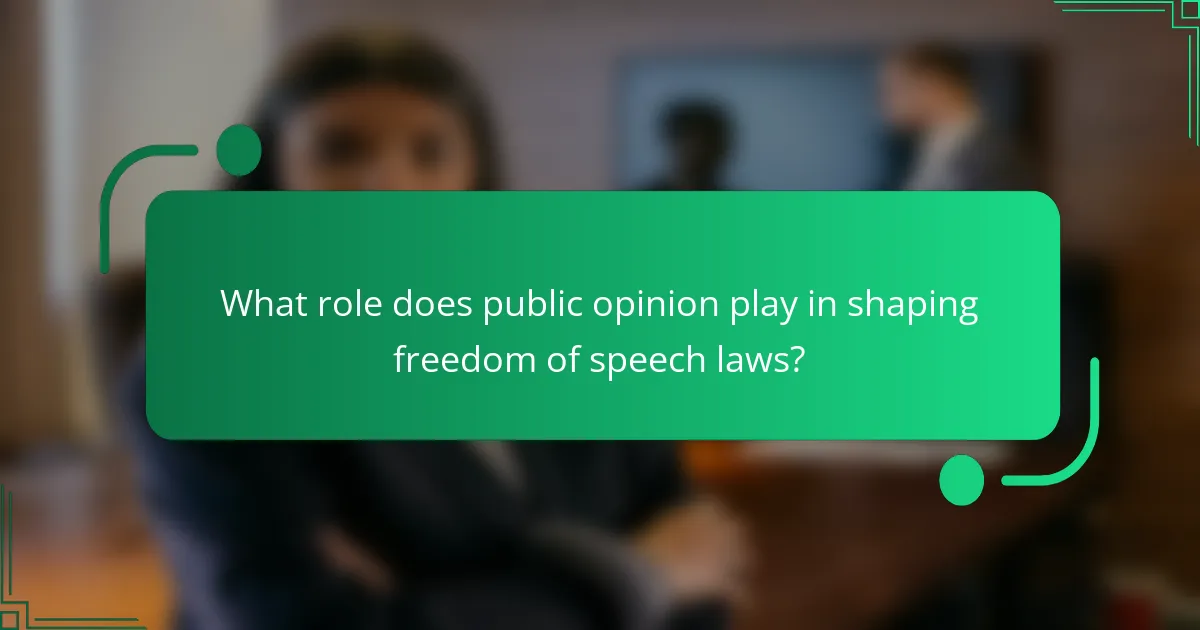
What role does public opinion play in shaping freedom of speech laws?
Public opinion significantly influences freedom of speech laws by reflecting societal values and attitudes towards expression. When a majority supports certain viewpoints, lawmakers are more likely to enact or amend legislation that aligns with those beliefs, impacting the landscape of advocacy journalism.
Influence of social media on public perception
Social media platforms serve as powerful tools for shaping public perception, often amplifying voices that might otherwise go unheard. They enable rapid dissemination of information and mobilization of public sentiment, which can lead to shifts in how freedom of speech is viewed and legislated.
For instance, viral campaigns on platforms like Twitter or Facebook can bring attention to issues of censorship or advocacy journalism, prompting discussions that influence lawmakers. This dynamic interaction can lead to increased pressure for legal reforms that protect or limit speech based on public sentiment.
Impact of advocacy campaigns
Advocacy campaigns play a crucial role in shaping public opinion and, consequently, freedom of speech laws. These campaigns often highlight specific issues, rallying support and raising awareness about the importance of free expression in society.
Effective advocacy can lead to significant changes in legislation, especially when campaigns utilize data, personal stories, and strategic messaging to engage the public. For example, campaigns focused on protecting journalists’ rights can mobilize community support, influencing policymakers to consider reforms that enhance freedom of speech protections.
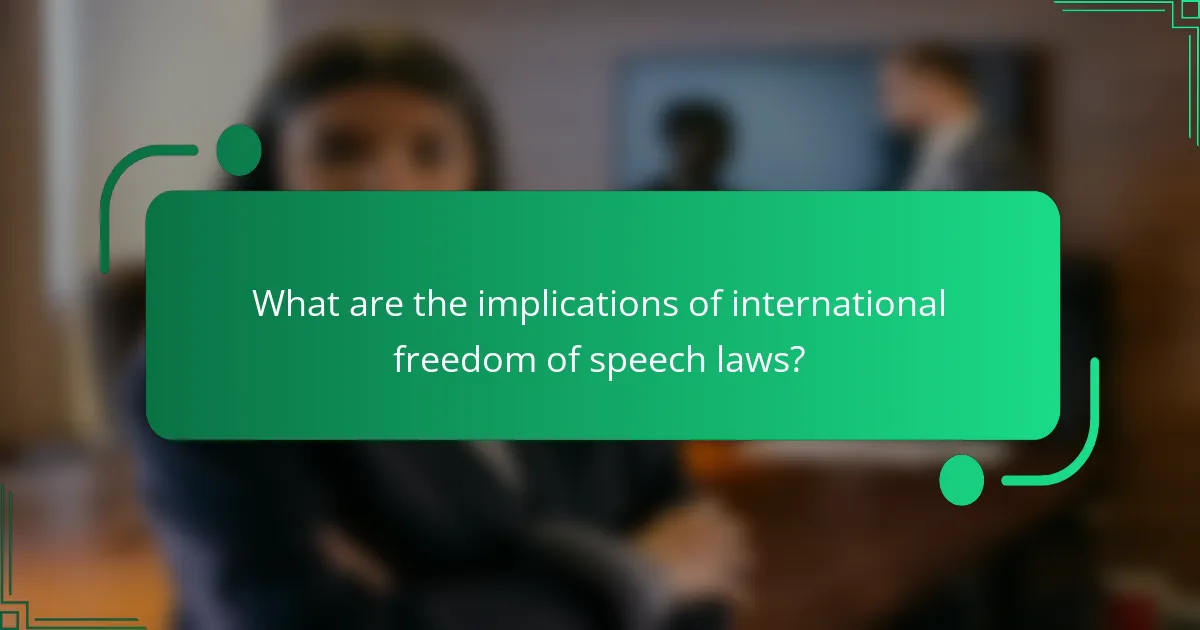
What are the implications of international freedom of speech laws?
International freedom of speech laws protect the right to express opinions without censorship or restraint. These laws significantly impact advocacy journalism by enabling journalists to report on issues of public interest, often challenging governmental and corporate power.
Comparative analysis with European laws
European freedom of speech laws, particularly under the European Convention on Human Rights, emphasize the importance of free expression while balancing it against other rights, such as privacy and reputation. This framework allows for some restrictions on speech, especially when it comes to hate speech or incitement to violence, which can differ from more permissive approaches in other regions.
For example, while a journalist in the United States may report freely on government corruption, a journalist in Germany could face legal consequences for spreading false information or hate speech. This variance highlights the need for journalists to understand local laws when operating internationally.
Global trends in advocacy journalism
Advocacy journalism is increasingly influenced by international freedom of speech laws, with many journalists leveraging these protections to address social justice issues, environmental concerns, and human rights violations. This trend is particularly evident in regions where traditional media faces censorship, as digital platforms provide alternative avenues for expression.
Moreover, global movements such as #MeToo and climate activism have seen journalists using freedom of speech laws to amplify marginalized voices. However, journalists must remain vigilant about the evolving legal landscape, as some countries are tightening regulations that could hinder their ability to advocate effectively.
